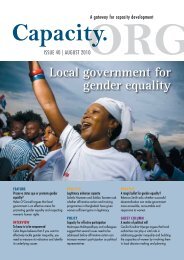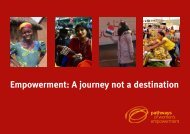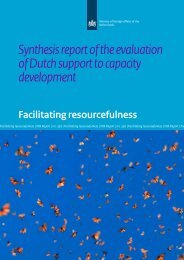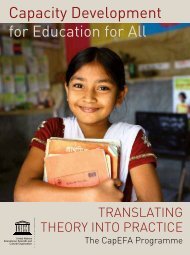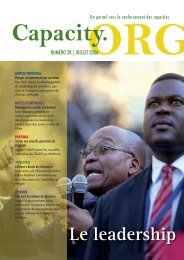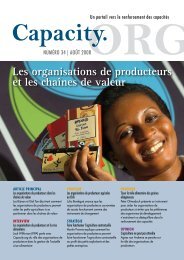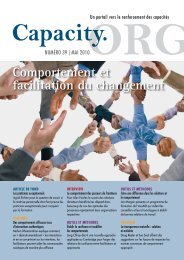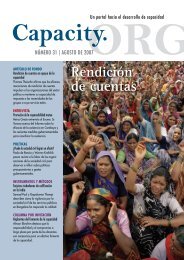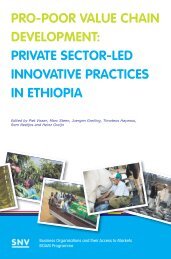Facilitating multi-actor change - Capacity.org
Facilitating multi-actor change - Capacity.org
Facilitating multi-actor change - Capacity.org
You also want an ePaper? Increase the reach of your titles
YUMPU automatically turns print PDFs into web optimized ePapers that Google loves.
There are many different types of powerand ways of looking at it from theperspective of MSPs.• Authoritative – the authority given to ortaken by a particular individual or group;for example, governments, legal systems,managers and social group leaders• Economic – the access to and control overfinancial and material resources• Coercive – the use of physical violence orpsychological manipulation to controlwhat others do• Knowledge – having privileged access toor control of knowledge, information andexpertise• Ideological – the use of ideas, culture,religion and language to shape the waypeople see their world and behave• Charismatic – the ability of individuals touse the power of their personalities to gaina following and exert influenceTo engage with shifting power, practitionersneed to:• Understand the dynamics of power at play• Work with less-powerful groups to helpthem identify concerns and issues clearly• Actively support the capacity developmentof some groups by facilitating access toresources• Build trust and understanding betweengroups so that the more powerful becomesupportive of others• Stop or <strong>change</strong> processes wheremarginalised groups are being furtherdisempowered• Facilitate processes in a way that ensuresall groups can contribute in an equitablewayNGOs in particular face difficult choicesabout the roles they will have in MSPs. Dothey try to be the honest broker and take onthe role of coordinating and facilitating theprocess? Do they decide that the interests oftheir constituencies are better served if theydevelop the power bases of particular sets of<strong>actor</strong>s to allow them to have more influencein the process?Both are important and legitimate rolesbut it is difficult for one <strong>org</strong>anisation to beeffective at both. Sometimes, decisions haveto be made about whether to support apartisan process of empowerment or take ona more neutral, stewardship function.As we can see in the palm oil example (see‘Palm Oil Story’ box), some groups opting fora more confrontational approach can bewhat precipitates <strong>multi</strong>-stakeholderengagement.Dealing with conflictFor an MSP to be effective in dealing withconflict there must be a high level of commoninterest. This is what makes it worthwhile forthe parties to try and overcome theirdifferences. If this does not exist, MSPs arenot an effective mechanism.Some MSPs are set up specifically to dealwith conflict; for example, as part ofHarvest at an oil palm plantation in South Sulawesi, IndonesiaThe Palm Oil StoryNearly 40% of all vegetable oil traded worldwideis palm oil. It is widely used in food, cosmetics,industry and as a biofuel. Already the world’sdominant oil, demand is set to grow dramaticallyover the coming years, especially from China andIndia.Most palm oil is produced in tropical areasusing land that was once rainforest. The ecologicalimplications of this are significant, and there arealso severe negative consequences for local andindigenous communities.This is a <strong>multi</strong>-stakeholder issue that is fraughtwith power and conflict issues from local level rightthrough to global level. In response to widespreadconcern and international campaigns, a groupof NGOs and palm oil companies formed theRoundtable on Sustainable Palm Oil (RSPO). Thisinitiative was relatively successful, yet unsustainableand socially inequitable practices continued.A coalition of local NGOs in Indonesia prevailedupon the World Bank Group to put a moratoriumon any further investment in palm oil projects untilthe situation could be properly addressed by aglobal <strong>multi</strong>-stakeholder consultation process. Thisprocess was able to bring the conflicting parties toround-table dialogues.The motivation behind the global consultationprocess was not to simply solve the conflict.Rather, it provided the World Bank Group withthe views of all the stakeholders involved so thatfuture investments could be made in a way thatwould ensure sustainable and equitable practices.Much emphasis was put on the need for betterengagement and conflict resolution processesbetween companies and local people.From a power and conflict perspective, thepalm oil story can give us a number of interestinginsights. First, the MSPs took place against abackground of significant conflict – local conflict,international conflict and corporate conflict. Thepotential of these conflicts to have a negativeimpact on the brand images of companies involvedin palm oil production and processing was oneof the f<strong>actor</strong>s that spurred the <strong>multi</strong>-stakeholderengagement into existence.The second insight we can gain from the palmoil story is that a ‘good cop, bad cop’ strategy wastaking place successfully with some NGOs optingfor a campaigning role and others supporting<strong>multi</strong>-stakeholder engagement.Third, we can see the different sources of conflictvery clearly. There are value differences aboutwhat constitutes well-being for local communities –economic growth or the preservation of traditionallifestyles and the environment. In the face of poorspatial planning and monitoring, there are majordisputes over the ‘facts’ of the situation: exactlywhat impact is the production of palm oil having onthe environment?Fourth, we can see that conflict and powerdynamics are leading to new forms of governance.Standards of sustainability are being developedand implemented not by government, but throughthe power of global NGOs and agri-foodbusinesses. Not all governments are happy with thisdevelopment.It is clear that a variety of <strong>multi</strong>-stakeholderprocesses will continue to have an increasingimportant role in finding ways of meeting theworlds demand for palm oil ... sustainably andequitably.Reuters / Yusuf Ahmadwww.capacity.<strong>org</strong> 9



